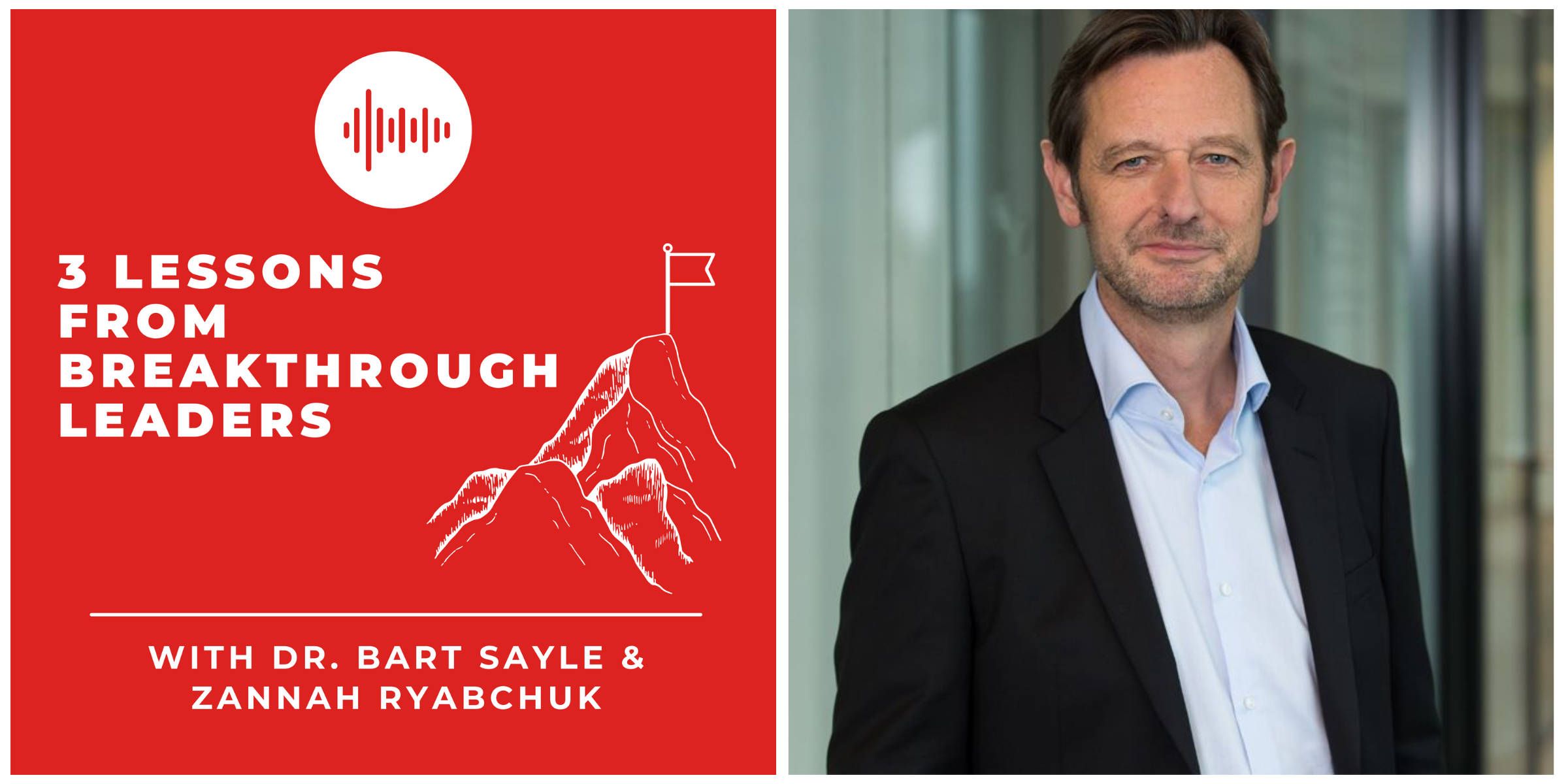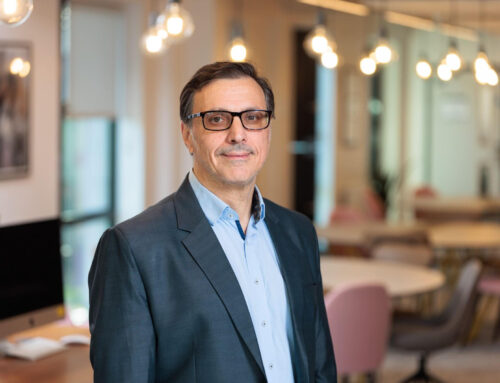 Listen to our new podcast episode where we explore the power of playbook culture from accomplished CEO Pierre Laubies. Learn how you can use playbook culture to cultivate a strong and successful team.
Listen to our new podcast episode where we explore the power of playbook culture from accomplished CEO Pierre Laubies. Learn how you can use playbook culture to cultivate a strong and successful team.
Pierre’s career spans across multiple global companies and he has acquired a strong reputation as a transformative leader focused on fundamental systematic change. Most recently he was the CEO of Coty Inc. A global leader in the beauty industry with a turnover of $9billion and 20,00 employees.
Prior to his position, Pierre was the CEO of JDE a privately-owned coffee company and he is now an advisor for a private equity firm.
Find out more about Pierre here https://www.linkedin.com/in/pierre-laubies-385a9936/
Listen to the S2 E5 ‘Playbook Culture’ with Pierre Laubies.
You will learn these 3 lessons from Pierre:
- The Importance of Business Mastery
- Why Playbook Culture Succeeds
- Inspiring Greatness in Leadership
This podcast episode was recorded in 2023.
If you enjoyed this episode, make sure you subscribe to this podcast and please do leave us a review and rating on your player of choice. We will be updating you on upcoming series on our social media so remember to follow us.
Transcript of the episode
Zannah Ryabchuk
Hello and welcome to the second series of 3 Lessons from Breakthrough Leaders with me Zannah Ryabchuk, CEO of Breakthrough Global.
Bart Sayle
And with me, Bart Sayle, founder of Breakthrough Global, where we’ve spent the past 30 years developing the breakthrough methodology to help transform companies and people looking to reach their highest level.
Zannah Ryabchuk
And this podcast is all about giving you insider tips, and the know how from the world’s foremost leaders and creative talents. Distilling their knowledge and experience into three lessons, which we guarantee will help you and your companies to unleash your potential. And you can get in touch with us at bartsayle@breakthroughglobal.com to find out more.
Zannah Ryabchuk
In today’s podcast, we’ll hear from Pierre Laubies. Pierre is an accomplished CEO in the consumer brands space and an experienced board director. His career spans across multiple global companies, and he’s acquired a strong reputation as a transformative leader focused on fundamentals and systemic change. He’s recognised for his international mindset, as well as his ability to consistently focus on teams alignment, and engagement. Today we will learn these three lessons: The importance of business mastery.
Pierre Laubies
There is no shortcut to success. When it happens, it’s a miracle. And the thing I know about miracles is that they are they are super infrequent. I prefer to bet on things which are predictable, frequent, and on which our chance of achievement is in the 90%.
Zannah Ryabchuk
Why playbook culture succeeds?
Pierre Laubies
If we want to grow this business or improve its profitability? What are the things that need to be refilled in three years time from now? And how are we going to organise to get it?
Zannah Ryabchuk
Inspiring greatness in leadership?
Pierre Laubies
Leadership is about importing stress, and exporting energy or constructive energy that people say yes, that I can do. And if I do that, once I’ve done that, I will get this result.
Bart Sayle
I’ve known Pierre for over two decades. We first met back in 2000 with Campbell’s soups. And then I think every time that Pierre has moved to a new assignment, and a new company, he’s brought us along, because he says we are part of his playbook.
Zannah Ryabchuk
And today we’re going to be talking a lot about his playbooks. I mean, a shameless plug I always use and I hope I use that word carefully. Pierre doesn’t mind me doing this. But often when I’m pitching to new clients, actually, I always quote Pierre, and I quote him saying, I have a CEO that we’ve worked with many, many times. And he says, you know, he’ll get an on paper strategy, he’ll often use a certain consultancy and some certain people within that consultancy, to write the strategy for him. But then he brings in breakthrough to bring that strategy alive to take it off the page and get people to own it and believe in it and drive it and execute it with excellence. And I should probably start paying in royalties for it, because I’ve been using. I’ve been training on that for a very, very, very long time. But it’s absolutely true. It is what we do, and it’s why he loves what we do and why we love working with him as well.
Bart Sayle
I think that also shows the way, Pierre and we’ll find out in this podcast, he has a very systematic and systemic way of working, that he has honed over the years. Until now it’s just predictably successful.
Zannah Ryabchuk
So what are today’s lessons from Pierre.
Bart Sayle
Lesson one, master the laws of your business.
Pierre Laubies
I’m a big proponent of one liner. And I think the first law of business that I’ve observed with that, success is 5% inspiration 95% perspiration. And you need to stay consistent, because when you have proof that your analysis is correct. And once you have laid on your plan to close the gaps that you have seeing in front of you whatever in that gap can be a cost gap, it can be a price gap, it can be an advertising gap, it can be close these gaps, right? Then you stick with it for a consistent effort. And I mean, Bill Gates used to say, most of us overestimate what they can do in one year and underestimate what they can do in 10 years. We all have the tendency to seek for shortcut to success. There is no shortcut to success. It doesn’t exist. When it happens. It’s a miracle. And the thing I know About me, I suppose that they are super infrequent. So I prefer to bet on things which are predictable, frequent, and on which my degree, our chance of achievement is in the 90%. And for that, again, I keep coming back to master the law of your business, once we understand how things need to be done, then we can focus on what is fundamental. In business, there are three things which matter the why to how and the what, right. The why is, why does the company exist? If the company has no reason to exist? It’s a problem. Right? And because at the end of the day, people say, Why would I go there? Why would I go and work and work there. And so it’s very important to have, I would call it a nobler mission and understanding of what is the whole the social order this company plays in the marketplace, it doesn’t need to be politically different from the competition. I mean, most of the people who manufacture cars manufacture cars to provide the same service to people. So like, most of the people who do pet food, kind of think, the same way of, of why they are in business for but inherently embedded into the fields of view of the company, and making sure that that your your mission is clear, and is understood, and people know why they come up to work in the morning is quite a fundamental task, it doesn’t take a lot of time to do, or to find out. But once it is there, it’s very important to repeat, repeat, repeat and repeat it again. Right. So that eventually all the tasks all the the decisions that people will make will be informed by this vision. The second thing which we have in the business is, the second most important thing in the business is the what, if I want to sell more of this product, I need to do something with it, I can change the price, I can change the colour, I can change the taste of this food, I can do something, that’s really where the difference is being made. That’s where we should spend 90% of our time 95% of all time. And the third thing, which is important is the how and when you don’t have a playbook culture. And in the playbook, for instance, in our world, we say we define how you build a brand at scale, what is the path that you need to take, what is the media plan need to make to be made of what is the brand what are these distinctive assets, what is a distinctive assets, certain number of parameters like that. If your organisation does not master this, how it will keep repeating time and time again, the same mistake, the truth is, 95% of the people who turn up to the office mean when they want to succeed, they want to be achievers, they want to perform, and but left to their own devices, they will make up stuff right on how to perform and you don’t want that because you want the energy to be really channelled towards what has the highest chance of result. And this is why it’s very important to make sure that these people, your employees, your associates master of the laws of your industry. And I see it as the entity and delegated the task of the leadership of a company to embed this knowledge into the company and to make the effort at the beginning to make sure that everybody masters this like you’re not going to give a 747 to take off with 500 passengers on board and with an itinerary from Frankfurt to New York to an amateur you will want that person to be super knowledgeable. Right? While that’s the same for everything. And and once I always had this philosophical approach. But once I’d found the ecosystem around me to enable me to find out what we needed to do, and structure to the people of the organisation how to do it intellectually and emotionally. Then we realised that we we could really accelerate the transformation.
Zannah Ryabchuk
What Pierre has identified here is something that we come across very, very frequently, which is the painful reality that there is no quick fix. There’s no silver bullet to transformation. And actually, we need to take a long term approach we need to repeat, repeat, repeat again and build our discipline, don’t we.
Bart Sayle
It’s all about discipline. And as Pierre says, its consistency, and a commitment to take a longer term approach and go through the ups and downs, but success will follow. It does require hard work. And some of that work may seem boring. I’ve heard Pierre in the past say that the best work comes from being brilliantly boring.
Zannah Ryabchuk
So our tip to keep people motivated when they’re enduring the 95% perspiration is that you’ve got to celebrate the quick wins, we would call this gossiping success. This isn’t about celebrating things that simply aren’t working, it’s not spin. But you really need to ensure that you are motivating people, inspiring them, and driving them to succeed by realising that they’re part of a winning team that’s critical to keeping people on the journey with you when you’re working on a long term approach.
Bart Sayle
Lesson two build your playbook culture.
Pierre Laubies
When you decide to turn on a company, one of the key playbook is to respect the first law of navigation. And the first law of navigation, which actually I remember learning from you about is to know where you are. And the second rule of navigation is to know where you want to go and the third rule of navigation is to take check every day of where you are, right, avoid the one degree drift. The other element of the playbook is to be really super objective about the point of departure, point of departure define your options. Where are you? Are you a leader? Are you a challenger? Are you on the high end business? Are you on the low end business? Is all of your business same? Or do you have like different market position and understanding that is absolutely vital, clearly having and that’s the first part of the playbook. For me, I do work in consumer good. I think each industry has its flaws, and understanding them, socialising them, and making sure that you have a critical mass of the organisation who not only understand these laws, but understand the value of adhering to them. Right? may sound obvious, but like, that’s, that can be the case that people know something, but that don’t apply it right. And at the beginning of any transformation, the time that you invest at that moment is time that you will save after. And you will be able to go in a true acceleration. When you get this critical mass of action which are all congruent, go all in the same direction, and said for enforce each other.
Bart Sayle
One of the things over my experience with breakthrough, one of the things that has happened with nearly every company I’ve worked with, is this wanting to rush into the how there’s a big difference between hurry up and pace.
Pierre Laubies
And one of the first things I love doing is when I start a new a new project with a new company is look at the innovation pipeline just has two people say this is the protocol to validate this innovation. That’s how we are going to validate this innovation. Two months later they come back and we can kill 90% of the projects. This give us an amazing resource. The US people in time we are going to take off we are going to create a in the system and we are going to focus on okay, what is it if we want to call this business or improve its profitability? What are the things that need to be substantially different in three years time from now? And how are we going to organise to get it it will say okay, we’re organising only on one bucket. And but at the same time, there are three other markets available where we’re not participating. If we go and participate there we will go our business or if we are getting in this market partition, but we all knew ability in mainstream and premium is developing that we will launch a premium product they will work on that and and as we work on that we know the rules of the game we win or we will be able to take our fair share. And and people find that incredibly liberating. In in one of my recent companies, we we did exactly the same exercise we cleaned innovation pipeline, the success rate of the innovation pipeline was on 30% 33% and at the end of the day, we clean everything reduce the size of pipeline quite drastically. But we ended up with 75% success rate And the bar of everybody increases. And then you can take a bit further risk to later stage because you know that you have when time you you have created within your sales by doing that.
Zannah Ryabchuk
Very early in my career at Breakthrough, I was very lucky that on one of our programmes with Pierre, I started to learn about this system, this process of using playbooks in the way that he implements them in organisations and how effective it is. One of the main things that they help to eradicate is, what we call in breakthrough, failure work. There’s two types of failure work, the first type of failure work is all of the work that never needed to be done in the first place. And there’s a huge, huge, huge amount of tasks and activities that go on in the world every single day, that simply didn’t need to be done. And the second type of failure work is all of the work that wasn’t done to the right standard or was done incorrectly the first time, and that we have to do it again, all the projects that fail that we need to redo, all of the PowerPoint presentations that aren’t right anything where the expectation hasn’t been set correctly, or we haven’t delivered to the right standard. And really, what playbooks do is they help to eradicate those two very, very big buckets of waste.
Bart Sayle
Our recommendation here is that you as a leader, start with yourself, go back into your organisation, and look at it with fresh eyes. And look where you’re involved in failure work because we can guarantee there will be failure work there, and start to eradicate that you’ll see the bonus of doing that immediately. Lesson three, inspire greatness in your talent. One of the things I’ve admired in you and with you is your leadership. So where did you first realise that you you were a leader, that your leadership was powerful, and that you could bring other people on?
Pierre Laubies
I’m not to sure you realise it. I think that my point, my intuition on that. One is that you do best what you like doing. The first step of my career were not to step of career, which would lead me to be CEO one day I mean, I started to work in finance. Actually, I started my life in a bit of do an unlikely place. And I was born in Morocco. And my parents had been living for two years in Morocco. And when Morocco gain autonomy, I think in the late 50s, my whole family was living in Morocco just exploded, my uncle went to the US and my mother and my dad went to little island, which was called Le Morne, midway between Madagascar and Maritius. And I did spend 17 years of my life there, and when you live on such a tiny place, and where you kind of the only one thing you see is mountains or ocean, your definition of the world gets a bit deformed. And, and you kind of have no idea of what is the size of the rest. And, and I thought it was a perfectly living life. And of course, the opportunities were kind of limited. So I I might save, or I plan like destiny to be the manager of the local swimming pool. And that was my objective in life, and I thought that was a great life. And unfortunately, around the age of 17, my mother came to us and say, I’ve made a decision, we are all relocating to France. And I guess that I gave up with a dream of being the manager of the local swimming pool and just get on with life. And actually it was with anxiety was probably the best thing which could have happened to me, different horizons. And I had a chance I have to say, to work in an ecosystem and to join them to join Morris Incorporated. And I think mars was was really a talent generation machine. And maybe that’s the benefit of being of being a private company. But they’re really focused on on giving people chances but also giving them I was hired by the French procurement of Mars as a finance management controller in 1985. And in 1990, I was European finance vice president. So like, even I was surprised by that like it was it was very, very fast but actually I realised that That was not exactly what I wanted to do. I just wanted to be my objective was to be general manager of a business. I did not want to be CEO, I just wanted to be general manager or business. So I remember talking to my colleague was running the French business British, an English man fantastic person he sat with me in the cafeteria in Germany and said so how are you doing? It’s a great job. But I already I mean, I’m not too sure. I’m done for that is what would you like to do? I say, I really would like your job. And, and you say, Well, I can make that happen. Like, but you can do it. But for that, you need to take a big line management job because you have been working on finance and the maximum number of people that you have been doing have been seven people I’ve been managing, I’ve been seven people, I want you to really manage a big, a big, large population as you okay, that’s that sounds like enticing approach and say, What do you have in mind, so you can be easily block manager or you can be a sales director, I take the sales. So I became a sales director. And that’s when I realised that there was a lot of logic insights, you need to prepare this pitch, and this thing but it’s actually when you work on the masses, when you have a business, which is like we had at a time, I think it was like 40% penetration of our product in the French household of 30%. Penetration a French household so that 15 million that was sold, you don’t need to know the name and address. Right? What you just do need, you need to do the right thing for the largest number of people. Right? And, and it’s when you have this relatively statistical approach or mathematical approach, it’s kind of liberating, because you see opportunities sitting in front of you, at the same time, for whatever, because it was logical. And you say, okay, it seems that distribution is the number one driver of performance. And so can we look in the current business that we have? Add the products, which are selling well, but don’t have maximum distribution. And I sat with one of my contacts, and I said to her, please make me the least of all these SKU, this company with the right of sales and in front of the line, the point of distribution, and she came back 24 hours later. And we discovered that the number three SKU use of the company at 20% distribution, the number six and 10% distribution, the number eight and 5% distribution, and these things like rotating like crazy. So we said okay, on top of what we do we do that too. And the business moved from 3% growth to 10% growth. And it was all logical. So that’s kind of to come back to your question. It’s a long answer. But to come back to your question, I think leadership is really you provide something which is really important for the motivation of people, you take the stress out. Leadership is about importing stress. And exporting energy and not exporting crazy energy it’s importing, exporting, or constructive energy that people say, yes, that I can do. And if I do that, once I’ve done that, I will get this result. Everybody wants that, who doesn’t want that people want to succeed. And for that, you need to give them the rules of the game. The most I would call it the way a leader can create most damage is to provide a plan or a vision without a plan and a planning.
Bart Sayle
I mean, you remind me of something that I read a while ago and one of the first sort of entrepreneurs in the computer industry in California, and he’d been brought up on, I think what used to be called Theory X management theory X, which is that, you know, people work for money. That’s about it. And that’s how you motivate them. And he didn’t believe this. But one of the things that he did, he was he started to make the first computers and he brought in sort of an assembly line model. But what he noticed is that people in the middle of the assembly line were much less happy than people at the end of the assembly line. And so he wants to check it out. So he went to some car companies and checked it out the same thing. And what he realised is because you know, the assembly line was a great invention in Ford and so on. But basically he was treating people as machines, and the people in the middle of the assembly line, they never saw a finished product. And so they never got that feeling of accomplishment. So what he did is he got rid of his assembly lines and he put together seven and eight member teams and The team was responsible for producing everything. And all of a sudden people far more motivated, you know, he brought in a lot of things that now people are talking about. So he brought in share options for them bonuses and so on. And before long he had a system going, which wasn’t a machine, it was people.
Pierre Laubies
Yeah, and I think that to to capitalise on this, on this point about, like, at the end of the day, we have element of satisfaction and element of motivation, a good salary, a nice car, stuff like that, this element of satisfaction, and they are important, if they are not there, it’s a problem. But it’s not enough people who want to participate and want to operate in a place where they learn and call the the field as you just said, successful. They feel they are winning again, I keep coming back to the to this point of view, which is that really the role of leadership is to establish this, make sure that this company has this operating system. And masters it. We you and I, when we prepare designer, this conversation, I was making reference between the Japanese car industry and the and the American car industry. I mean, for it took, I mean, despite all the wait faults because the Japanese had the Kanban model just in time where their head explain it to the shop floor level, or the factory. And people mastered it at the shop floor level of the factory, they could defeat the American car industry. For me that was before going to mars I was working in the car industry. And that was a very profound understanding I had at the time that actually, you really need to make sure that the entire system gets it.
Zannah Ryabchuk
Pierre we’re speaking here about something that’s very close to my heart and all of us at Breakthrough, which is the enormous amounts of stress that we see leaders create. And actually it’s a leaders job, it’s the leaders duty and role and duty of care to take that stress out of the system to enable people to perform at their best. And you need to ask yourself as a leader, are you creating more stress than you’re taking out of that system? Are there too many priorities in your organisation? Is there lots and lots of activity? Is there a sense of chaos? And if so, how can you put more clarity into that chaos and simplify the space so that people are able to perform at their highest level?
Zannah Ryabchuk
All right, so this is the part in the three lessons from breakthrough leaders podcast where we ask you your hotseat questions. Yeah, are you ready? Born ready. What inspires you in life?
Pierre Laubies
Honestly, our world I’ve been travelling a lot and by background I mean I come from a family of nomads. And so I’ve been travelling a lot but I have to say that I think we are lucky to have this planet. I mean really like and the people on it too. And I think that I visited there are 195 countries in the world up to 79 so far from being done and and I intend to dedicate the rest of my life to do just that. I think we also honour the beauty we are surrounded by beauty while surrounded by amazing people amazing cultures. Of course I won’t be able to go everywhere because not everything is open. And so I kind of have crossed off North Korea for a while. And that they’ve done I think again people mean well, we all live in beautiful environment and we live in beautiful countries. And discovering of them is like is one key passion I have
Zannah Ryabchuk
finished this sentence success is
Pierre Laubies
5% inspiration 95% perspiration.
Zannah Ryabchuk
And if you could only take one book to a deserted island what would it be?
Pierre Laubies
The biography of Charles De Gauelle by Max Gatto. Not because we kind of Charles De Gaulle and I have the same nose kind of. but deep down I mean I’m a great admirer of Max Gallo. I don’t do novels, very well. I’m not very interested into a hypothesis, I’m really interested into real facts. And as you would have guessed, the biography of Charles De Gauelle by Max Gallo, I think I’ve read it seven times?
Bart Sayle
And Charles De Gauelle is that is that somebody you Who inspires you?
Pierre Laubies
Yeah, of course, I mean, the, the oxygenation that he needed to have. And yeah, the steel the belief he had is in the, in the role of a leader, they will call them at the time a chef, a bit. Not very adequate, but somewhat the responsibility of the leader, I think is something that which was very admirable in him. And the same in Winston Churchill, the same design to the world the same way as with many people today. And so being a plant manager or a shop floor worker or sales director or the key accounts you have, we all have responsibilities. And the reward is the reward the emotional reward is to accomplish our goal and see and leave something behind us which is better than what we had when we moved in.
Bart Sayle
Pierre, this has been wonderful. So thanks again. Thanks,
Pierre Laubies
Thanks again guys for the opportunity.
Bart Sayle
Thank you for joining us for today’s three lessons. Do make sure you hit the subscribe button. And join us each month for three more lessons from breakthrough leaders.
Zannah Ryabchuk
And if you’ve got a question or comment or want to find out more, you can email us at bartsayle@breakthroughglobal.com or connect with us on LinkedIn at Breakthrough global or on Instagram at global breakthrough.
Bart Sayle
We’d love to hear your own leadership stories. And we’d also love for you to share this episode on your own social media and review and rate this podcast on the player of your choice.
Zannah Ryabchuk
And so once again, thanks to our production team. Julia Šoltysová over at Breakthrough global and Robin Lee Burnett, Fairly Media and of course, thank you for listening.





